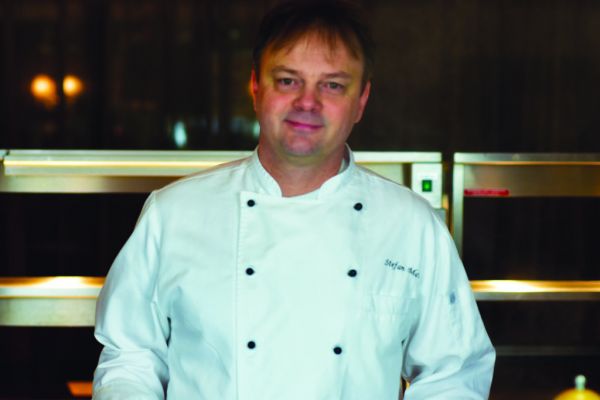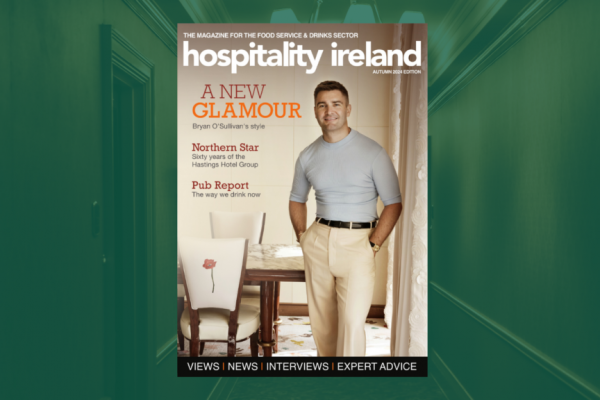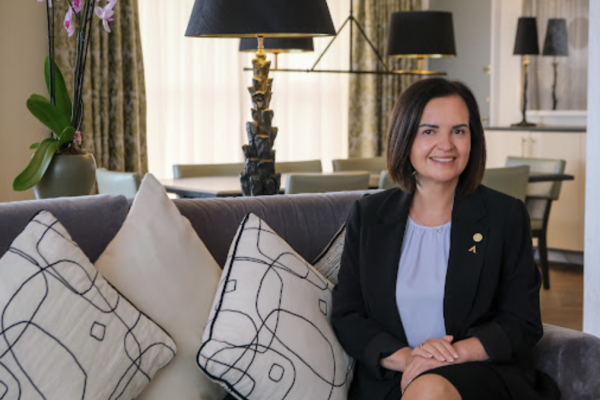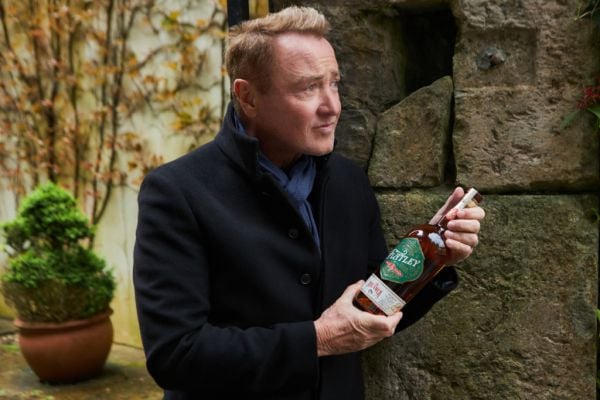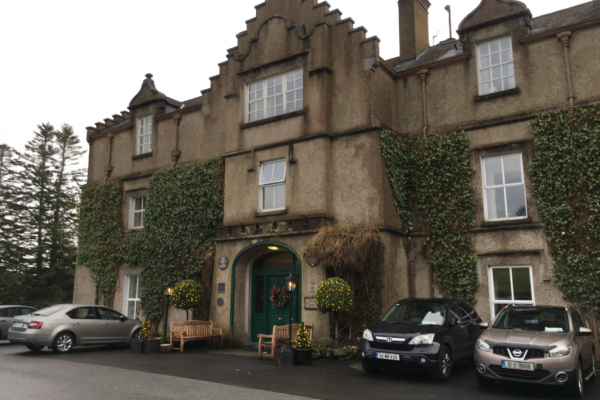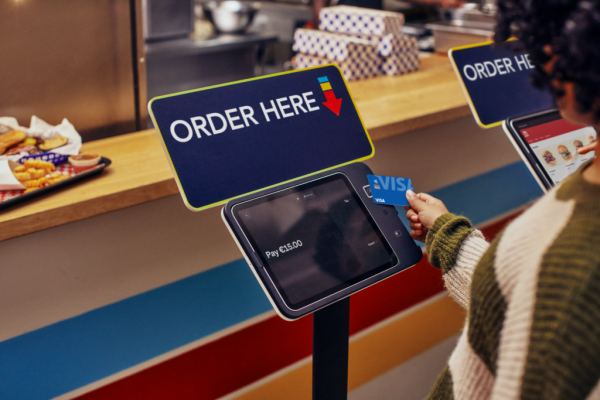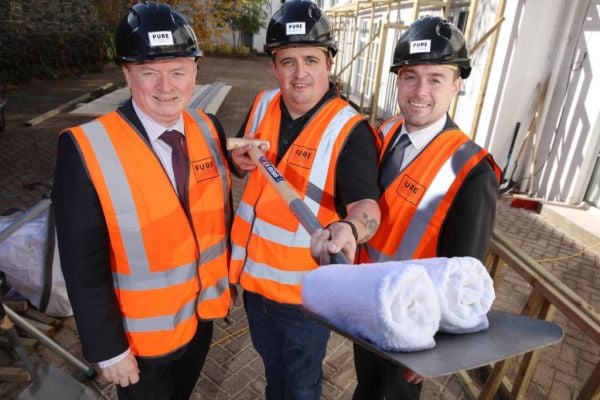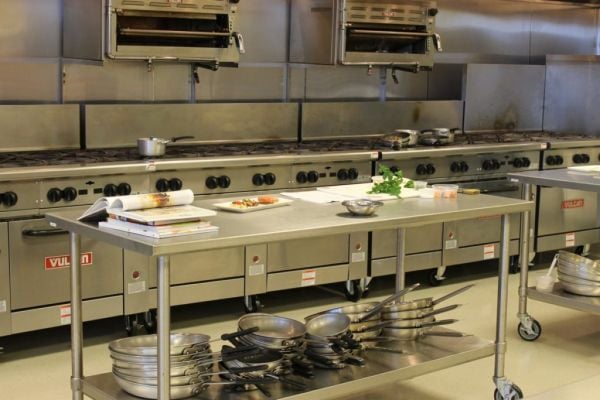The iNua Collection, which includes brands such as Muckross Park, the Kilkenny Hibernian, and the Radisson Blu Athlone, have recently introduced an exciting new initiative – a Professional Cookery Traineeship in association with Limerick Clare Education & Training Board. Stefan Matz, group executive chef, tells Hospitality Ireland how the programme works, and why it is vital right now.
This article was originally published in the Autumn 2021 issue of Hospitality Ireland Magazine, in October of 2021.
In an industry beset by staffing shortages, and a landscape in which professional training is less resourced than it should be, this seems like an much-needed plan. So where did it the idea come from? “I suppose it's really coming from the need of a training solution,” Stefan Matz says. “In Ireland, as you know, there's no real training solution that suits everybody. Our hotels, with the regional locations we have – we researched and we tried to avail of the great opportunities out there for some hotels to train the staff – but because of our locations, we are a bit more limited. Considering that some hotels are located an hour and a half away from the nearest college, that makes it very difficult.”
There are, he says, “great apprenticeships, but unfortunately for us, and for many others, they don't suit because of location.” And so, they made their own. “We bring all the commie chefs together, train them together, give them a very good education, skills and experience. It took us a while to find the right college to partner with, and in the end, Limerick Clare Education & Training Board really seemed to be a perfect fit for us.”
What is the structure of the plan, I wonder? Do people commit to staying on for a certain amount of time after they graduate or how does that side of the equation work? “Ideally, yes,” Matz says, “But we have to be realistic, you know. The program runs for two years so nobody has to commit for more than two years. Because in the end, you know, we want to make it attractive for people to join the industry. The industry always benefited from people travelling all over the world, going from one hotel to another, one restaurant to another. And that will remain. So we don’t want to tie them into anything. What we hope is, if we start training people in our regional hotels then yes, they may move away, maybe after two years, but they could come back two years later with more experience. This way, we bring more people into the industry because of their great experiences. Hopefully other hotels will follow us, and therefore we might benefit in the long run from similar hotels with similar training opportunities, where we would all gain from what has been passed on to the commis.”
A scheme such as this is, he rightly says, “needed in the industry. We stopped training people at a certain stage, when the Celtic Tiger professional rush started. That's part of the problem now – why we have so few chefs in the country. Then with COVID of course, it all intensified. At that point, 50% of our kitchen and workforce were basically non-Irish. Some of them went home and are not coming back, and that has accelerated the whole situation we have at the moment. We all have to work on solutions, and what we're offering with this programme, is what we see as one solution.”
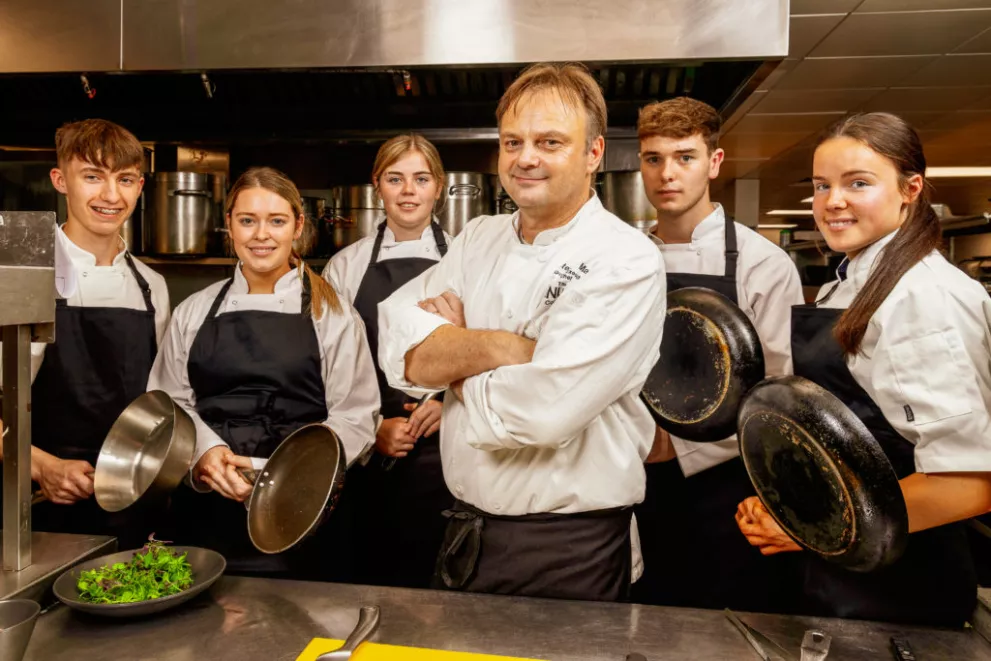
Stefan Matz and team
Response
How has the response been in terms of uptake so far? “In some hotels it's very good. Elsewhere, it might be a location issue where we have a bigger catchment area. But in some of the hotels it is very strong; we are perhaps looking at people who have worked for us maybe for a year or two years, and have shown interest in cooking. We are also trying to attract people who are just finishing school or college.”
“We know it will take some time because, being honest, the catering industry, the hospitality industry hasn’t always been portrayed in the best light in recent years, so we need to change the perception.” How do they contribute to doing that? “We need, number one, to be sure that what we offer is attractive, and number two, we need to demonstrate that. Until we get to that point, it may be that we look to people from outside of Ireland to join the programme. For example, if we are looking for 14 Commis chefs, we might get 12 applying from Ireland. In order for us to complete the course, we might then decide to offer places to two people from outside of Ireland, from a European destination where there are fewer opportunities for chefs to get proper qualifications. We will invite them to join us.”
From a financial point of view, how does it work? Do participants pay to do the course? “First and foremost, the commis chef doesn't have to pay for anything. That's great for them. The college is funded by the government, it's part of one of the great initiatives they have. Then, what we do as employer is, we pay each person a good wage, when they're working with us in the hotels. But we also pay for them when they're going to college. So if they're going to college for a week, they still get their weekly pay. You earn while you learn. And if they have to travel for college, for example, from to Sligo to Limerick, we pay for their transport. And while they're in Limerick, we put them up in one of our hotels; we accommodate them and we feed them. So for participants, this doesn't come with a cost.”
That’s certainly an attractive opportunity; how does he feel we're doing in Ireland generally, in terms of positioning hospitality as a competitive career? “We are still lagging quite far behind, and not just when it comes to chefs. In most countries – Southern Europe, Portugal, Spain, Italy – to be a waiter is a profession for life. People are proud of the job there. In Ireland, if we didn’t have teenagers and college students, we wouldn't be able to survive. It's time that changed, time for hospitality to becomes a profession which is respected, and considered by those looking for a good career. The truth is, this is probably one of the best industries you can work in, but it just takes a bit of time to get that across.”
What would be simple ways to do that, to position this industry as something really attractive? “I think we need more options. Our colleges are great – Shannon, GMIT, TUD – they're all fantastic options, but I think they need to extend a little bit more regional. The ETBs were funded by the government and are fantastic. And the national apprenticeship programme is fantastic. So we just need more of those options firstly, and then, the most important thing is I think, to create the perception and a realistic understanding that the hospitality industry is actually a fantastic opportunity among the public. That's where it really needs to change. Some employers are investing in online videos, to show people how good this industry can be. Unless we can change the perception, whatever the education and work experience we provide, we won't get enough takers unless we really make sure that people understand that this is a fantastic industry.”
Presumably that involves reaching out to secondary schools also? At the point where people are getting career guidance, this needs to be put forward as an attractive career? “Absolutely, That’s where to find those people who are interested in a trade, in skills, an apprenticeship and training. Because these are people who may not enjoy the academic side of education. After the Leaving Cert, there are a lot of people who want to do something other than go to university. We need to show them what this industry and profession can bring. How many industries are there where you can learn for two or three years, then travel around the world, make friends, and have experiences, see different cultures and cuisines? That's the message we need to get across. I think if we get that right, everything else will follow easily. Then it becomes a situation where we need to offer more courses, more colleges, more options.”

Kilkenny Hibernian Hotel Exterior
Re-opening
On a different note, how have things have been for iNua since the reopening? “It's a big challenge obviously, having been closed for many months. Reopening means having to re-hire so many staff members, because people have left the industry, people have left the country. And of course, everybody had to adjust again from being out of work for several months, back to a very busy environment. So that's challenging. And then on the other hand, it has been a very busy summer. We have been blessed with being busy, and that we have been able to get the staff we needed. But it has been challenging at times.”
Looking forward to the autumn and the run-up to Christmas, does he think there is sufficient clarity, around what can be done within the industry? “I think it's a bit too early to say. A lot will depend on the guidelines and the restrictions that are in place, without a doubt. And that's where clarity has to come in; can the government be clearer? I don't know. I know they need to take a lot of advice. But once we have the information, then we can plan more appropriately. And that is needed. Nobody can forecast yet how it's going to be but I think the signs are very positive, and we need to be positive. If you want to leave the difficult times behind, the only way is by being positive, and looking ahead.”
Does he believe that is happening? That there is a feeling of wanting to move forward? “Absolutely. And that's what we need as a society and as individuals. We need to leave behind the difficult times we had. But certain things will stay with us, and we have to accept that. We build Covid protocols into our standards, our training, because in certain ways, it's here to stay. And it's also good from a business point of view that we have things in place. Because you never know what's around the corner. It could be something localised. It could be something global. Next time, if something would happen, I'm sure even the WHO will be much more prepared and able to step in more easily and quicker than in the past to avoid the same escalation. I think we all have learned a lot. And yes, it's great to depart from it. But let's be ready for anything that might becoming around the corner in the future.”.
AT A GLANCE
iNUA COLLECTION
HOW MANY PROPETIES: 9
HOW MAY BEDROOMS (IN TOTAL): 99
HOW MANY STAFF: 1,000
HOW MANY COVERS (IN TOTAL):
19 Bars & Restaurants, 78 Meeting spaces, 5 Coffee Docks, 7 Convention Centres with Capacity of 500+
Read More: Hospitality Ireland Autumn 2021: Read The Latest Issue Online!

